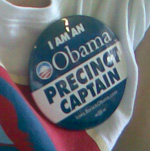Pennsylvania primaries.
You’d have thought it was a horse race, or a football game. Every TV anchor was buzzing about Hillary Clinton needing to win by at least ten points to remain viable. (in fact, according to Slate.com’s delegate counter, she would’ve needed at least 65% of the vote to stay on track to catch Obama.)
So when they called her as the projected winner–with only 2% of precincts reporting–the question was, would she cross that ten-point threshold?
Not quite. She won by 9.2 or so points, but because Pennsylvania’s delegates are assigned by district, she only came out with nine (as of last count) more delegates than Obama. She still got the win, though, and the boost in her donations that came with it.
Your humble Political Buzz correspondent was behind the scenes on Election Day as a volunteer with the Obama campaign. I reported to the Northeast Philadelphia headquarters at 6:30 AM, caffeinated beverage in hand, and was shortly dispatched with a sign to the street corner to get people excited and remind them to vote.
I was only flipped off three times, and one gentleman who gave me the thumbs-down told me through his car window that it was because Obama “is a Muslim.”
You’d think that after all that drama over Rev. Wright, people would’ve absorbed the idea that Obama’s a member of the Trinity United Church of Christ. Maybe they’ve got Wright confused with Farrakhan, whose name keeps creeping into the debates at the most unlikely times.
For most of the afternoon, I was manning the front desk and the phone for legal complaints and calls for rides to the polls. I never realized that there were so many ways to disenfranchise voters until this week, and I never thought I’d say that South Carolina’s system of anything was better than Pennsylvania’s.
One man came running into the Obama headquarters a few days before election day, asking for an absentee ballot because he had to go out of town unexpectedly. But the deadline for absentee ballots was past, and he couldn’t vote. Other states have absentee-in-person or early voting, where you can apply for an absentee ballot and vote at the same time, right up until the actual election day.
Likewise, the voter registration deadline was a month before the primary, and many voters did not receive their registration information in the mail. I took calls from people on Election Day who said they had registered but were not listed, and at first were denied provisional ballots (which, as Lori Plazinski explained in our earlier interview, should be given to anyone who requests one).
Same-day voter registration and early voting would solve most of these problems–even negating the need for open primaries, since a voter could change parties that day if they wanted to vote Democratic or Republican and were not registered that way. And Representative Rush Holt, D-NJ, has written a bill to ensure verifiable paper trails for all elections, but House Republicans blocked it from reaching a vote on Friday.
Aside from voter problems, we ran a massive get-out-the-vote operation out of the Obama office. Canvassers went door-to-door among Democratic voters, reminding them to vote and letting them know where their polling place was. All of the canvassers–and indeed most of the office staff–were unpaid volunteers, many from out of town who had come to Philadelphia on their own dime to spend long hours on their feet.
I met a man from California who had flown out by himself and paid for a hotel for the week to volunteer. Two men who had spent the whole day going door-to-door asked me to pose for a picture with them, telling me that they were the oldest volunteers there that day, at 71 and 72.
One volunteer, middle-aged, had released his first song to the radio that week, a salsa tune in Spanish about Barack Obama.
The campaign field organizers, many of whom were on their fourth state and fourth set of primaries, were mostly young women in their twenties. And the Obama campaign has just unveiled a plan for a massive voter-registration drive across all 50 states, aimed at increasing participation in the coming election again, at the grassroots level.
The primary campaign this year may be going on for a long time, and may be creating a long and protracted battle for the Democratic nomination, but it’s also spreading interest and involvement from state to state. It is drawing new voters to register and participate in the democratic process, and exposing flaws in the voting systems. Debates like the one on ABC recently do little to improve the state of politics in this country, but grassroots action, at least on the Democratic side, is creating change a little bit every day.
And so on we go to Guam, North Carolina, and Indiana.
Reader mail can go to sarah.jaffe-at-gmail.com. Please include “Political Buzz” in the subject line or it may go to junk mail!

